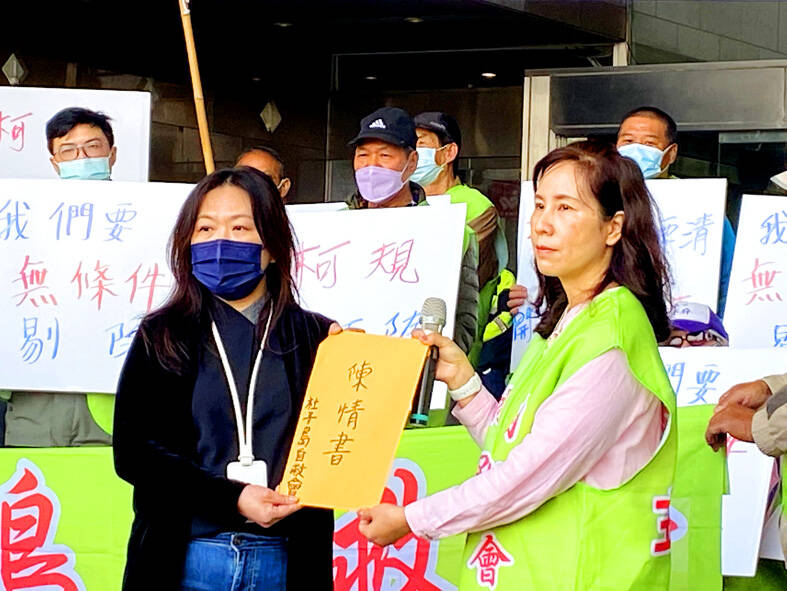The Shezidao Self-help Association yesterday staged a protest in front of Taipei City Hall, calling on Taipei Mayor Chiang Wan-an (蔣萬安) not to follow the former administration’s policies to develop the Shezidao (社子島) area and to renegotiate with local residents.
The Shezidao Peninsula, an alluvial plain at the confluence of the Sindian (新店溪) and Keelung (基隆河) rivers, was in 1970 designated by the city as a restricted development zone due to frequent flooding. The decision banned new construction in the area, leaving it underdeveloped.
During the administration of former Taipei mayor Ko Wen-je (柯文哲), Chiang’s predecessor, an online poll was held to choose a development plan for Shezidao and an “ecological development plan” received the most votes.

Photo: CNA
The plan’s expropriation zone is being reviewed by the Ministry of the Interior, while the Taipei City Government plans to hold an explanation session with residents on Saturday.
Association spokesperson Li Hua-ping (李華萍) yesterday said that during his election campaign, Chiang promised to deal with the residents’ request to preserve some settlements “with utmost sincerity and empathy.”
However, the explanation session would still use the previous expropriation criteria, neglecting their wish to renegotiate, Li said.
The residents are calling on the city government to postpone the session, or they would boycott it, Li added.
The association also listed four demands: “refuse land speculation, residents want to live peacefully on their original homeland;” “refuse mass construction, Taipei residents need urban resilience;” “refuse Ko’s plan, residents want renegotiation with the Chiang administration;” and “refuse to be left to rot, the government should allow legal house repairs.”
Li said the planned expropriation would destroy some farm villages, forcing about 11,000 people from their homes, and might result in land speculation.
Massive projects, including a 9.5m high levee, might not prevent floods, especially as the climate is becoming more extreme, Li added.
The association said the city government should not leave their houses to decay by refusing to allow renovations.
If city officials do not agree with new development plans, they should supervise Shezidao residents in repairing their homes legally, while renegotiating with them to gain their trust, it said.
Taipei Department of Land Administration Deputy Commissioner Wang Jui-yun (王瑞雲), who received a written petition from the protesters, said she would convey their demands to Chiang.
She said an “ecological development plan” is still the overall direction for Shezidao.
The city government has held cross-departmental discussions regarding the association and the residents’ demand to preserve some villages, she said.
It would continue to communicate with the residents through explanation sessions, workshops and home visits, she added.

The inspection equipment and data transmission system for new robotic dogs that Taipei is planning to use for sidewalk patrols were developed by a Taiwanese company, the city’s New Construction Office said today, dismissing concerns that the China-made robots could pose a security risk. The city is bringing in smart robotic dogs to help with sidewalk inspections, Taipei Deputy Mayor Lee Ssu-chuan (李四川) said on Facebook. Equipped with a panoramic surveillance system, the robots would be able to automatically flag problems and easily navigate narrow sidewalks, making inspections faster and more accurate, Lee said. By collecting more accurate data, they would help Taipei

TAKING STOCK: The USMC is rebuilding a once-abandoned airfield in Palau to support large-scale ground operations as China’s missile range grows, Naval News reported The US Marine Corps (USMC) is considering new sites for stockpiling equipment in the West Pacific to harden military supply chains and enhance mobility across the Indo-Pacific region, US-based Naval News reported on Saturday. The proposed sites in Palau — one of Taiwan’s diplomatic allies — and Australia would enable a “rapid standup of stored equipment within a year” of the program’s approval, the report said, citing documents published by the USMC last month. In Palau, the service is rebuilding a formerly abandoned World War II-era airfield and establishing ancillary structures to support large-scale ground operations “as China’s missile range and magazine

STATS: Taiwan’s average life expectancy of 80.77 years was lower than that of Japan, Singapore and South Korea, but higher than in China, Malaysia and Indonesia Taiwan’s average life expectancy last year increased to 80.77 years, but was still not back to its pre-COVID-19 pandemic peak of 81.32 years in 2020, the Ministry of the Interior said yesterday. The average life expectancy last year increased the 0.54 years from 2023, the ministry said in a statement. For men and women, the average life expectancy last year was 77.42 years and 84.30 years respectively, up 0.48 years and 0.56 years from the previous year. Taiwan’s average life expectancy peaked at 81.32 years in 2020, as the nation was relatively unaffected by the pandemic that year. The metric

A 72-year-old man in Kaohsiung was sentenced to 40 days in jail after he was found having sex with a 67-year-old woman under a slide in a public park on Sunday afternoon. At 3pm on Sunday, a mother surnamed Liang (梁) was with her child at a neighborhood park when they found the man, surnamed Tsai (蔡), and woman, surnamed Huang (黃), underneath the slide. Liang took her child away from the scene, took photographs of the two and called the police, who arrived and arrested the couple. During questioning, Tsai told police that he had met Huang that day and offered to